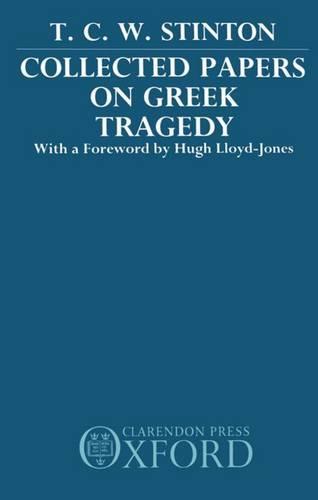Overview
T. C. W. Stinton was a highly respected classical scholar who died in 1985. He was a Fellow of Wadham College, Oxford, for over thirty years and devoted his life to teaching, inspiring his pupils with his own passionate love for the classics. As well as generously encouraging the work and publications of others, he also spent much time himself in researching and writing, concentrating mainly on Greek tragedy. This volume presents twenty-six of Tom Stinton's essays and reviews, mainly on Greek tragedy, covering his work from 1960 until his death in 1985. The papers include `Euripides and the Judgement of Paris', `The Scope and Limits of Allusion in Greek Tragedy', `The Apotheosis of Heracles from the Pyre', and `Greek Tragic Texts and the Limits of Conservatism'. Sir Hugh Lloyd-Jones, formerly Regius Professor of Greek in the University of Oxford, has written a foreword especially for this collection.
Full Product Details
Author: T. C. W. Stinton (Late Fellow, Late Fellow, Wadham College, Oxford) ,
Hugh Lloyd-Jones
Publisher: Oxford University Press
Imprint: Clarendon Press
Dimensions:
Width: 16.20cm
, Height: 3.70cm
, Length: 24.20cm
Weight: 1.060kg
ISBN: 9780198140542
ISBN 10: 0198140541
Pages: 528
Publication Date: 02 August 1990
Audience:
Professional and scholarly
,
Professional & Vocational
Format: Hardback
Publisher's Status: Active
Availability: To order

Stock availability from the supplier is unknown. We will order it for you and ship this item to you once it is received by us.
Reviews
'The book is a storehouse of learned commentary.' Malcolm Heath, The Classical Review. 'Stinton's conclusions do not always convince; given the nature of the subject, that goes without saying. But his arguments always demand serious attention, and that must be counted a major achievement.' Times Literary Supplement 'These papers display clearly that 'unusual determination to get as near as possible to the truth' to which Hugh Lloyd-Jones pays tribute in the forward... We are indebted to the Oxford Press for making this collection available'. Malcolm Heath, The Classical Review, vol XLI, no 2, 1991. 'meticulous attention to detail ... The Oxford University Press is to be thanked for bringing together in one weighty volume the unfailingly insightful explorations of such a gently humorous, subtle and sensitive interpreter of Greek tragic texts.' Michael Comber, St. John's College, Oxford, The Journal of Hellenic Studies, Vol. CXII, 1992
<br> An immense tribute to one of that University's finest scholars, a keen-eyed, precise critic, who was endowed with a seemingly bottomless reservoir of common sense....There is something in this book for everyone....Stinton is a through-going profiessional whose collected papers are filled with valuable insights and judgments for all. --New England Classical Newsletter & Journal<br>
An immense tribute to one of that University's finest scholars, a keen-eyed, precise critic, who was endowed with a seemingly bottomless reservoir of common sense....There is something in this book for everyone....Stinton is a through-going profiessional whose collected papers are filled with valuable insights and judgments for all. --New England Classical Newsletter & Journal<br>



